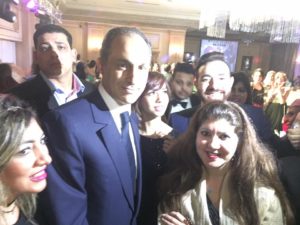By Farid Farid
 Cairo (Egypt) –In recent weeks Gamal Mubarak has shown up at a wedding, a funeral and a soccer match, happily snapping selfies with onlookers who are still enamoured by the flamboyant figure who was groomed to succeed his father, Hosni Mubarak, the dictator who ruled Egypt for three decades.
Cairo (Egypt) –In recent weeks Gamal Mubarak has shown up at a wedding, a funeral and a soccer match, happily snapping selfies with onlookers who are still enamoured by the flamboyant figure who was groomed to succeed his father, Hosni Mubarak, the dictator who ruled Egypt for three decades.
Mockingly referred to as Jimmy, the investment banker rose through the former ruling party’s ranks, along with a coterie of influential businessmen bolstering his political capital, to run the most populous Arab country for years, before a revolution erupted and Mubarak snr was deposed during the Arab Spring.
He is still widely regarded as embodying Egypt’s endemic corruption, along with his brother Alaa, who appears in the Panama Papers, amassing a fortune from buying and selling Egyptian debt through offshore accounts.
The brothers were tried and later released for embezzling millions of dollars of state funds used to renovate their palaces as well as cases of insider trading to the tune of £E2.5 billion ($187 million).
But they have been making more public appearances in recent months, stoking rumours of a possible presidential run in 2018 against the current military-backed President Abdel Fattah al-Sisi.
“So what if he [Gamal] runs for president? Isn’t this what democracy is supposed to be about?” asks Khaled Abdel Naim, 52, a high school teacher who runs a kiosk in an upmarket suburb of Cairo by night.
“I was one of those voices wanting him to become president before his father stupidly did not want to step down until he was deposed by force,” he says. “They would have reformed the country. They grew up with silver spoons in their mouths and wouldn’t have looked at us to steal more.”
The nostalgia for the Mubarak clan’s return comes on the back of Hosni Mubarak being acquitted of all charges for killing protesters in 2011 earlier this month.
“Gamal was a pivotal decision maker and had an important say in several key portfolios,” says Mohamed Naeem, a political analyst and writer who lived in Australia before the 2011 revolution. “He was de facto ruler from about 2004 [to] 2010.
“There are nostalgic factors in certain sections of the media in amplifying his routine public appearances to mean something else.”
A widely shared phone call on social media of a gushing journalist playfully interviewing Hosni Mubarak after his acquittal is the latest example of the political amnesia that the country has undergone. She repeatedly asks the former president if she can talk to his sons.
“There are also some elites and businessmen that look to Gamal Mubarak as a figure, whether or not he can actually play a political role,” Naeem adds.
Several Mubarak cronies have struck reconciliation deals with the state, effectively trading their sentences for investments in the economy.
Mubarak-era prime minister Ahmed Nazif, information minister Safwat al-Sherif and culture minister Farouk Hosny have all walked free recently.
“I don’t believe Gamal would be allowed to be involved in politics again by the current military regime as he is perceived as a threat to it,” says Zeinab Abul-Magd, a professor at Oberlin College who has written a book on the Egyptian military’s economic empire.
Estimates for the military’s expansive economic activities range between 5 and 40 per cent of the entire economy. Sisi said in December 2016 that the military’s share of the economy was about 2 per cent at best and that he hoped it would be more.
“Gamal Mubarak’s cronies would continue to be a threat to the military regime because of their economic influence and potential revival of their connections with old security apparatuses figures,” Abul-Magd adds.
She points to Gamal’s close friend, steel magnate Ahmed Ezz, as an example of the military’s intolerance for economic competition. A court ordered his arrest again this week on corruption charges.
Legally the Mubaraks are not allowed to hold office or any political position for six years, so a presidential run is not on the cards in 2018.
Yet that has not stopped them from carefully manicuring their public image as many Egyptians express impatience with a languishing economy.
However, Robert Springborg, a retired Naval Postgraduate School professor and expert on Egypt’s military who also taught in Australia for several years, says the key to Gamal’s political ambitions lies with tycoons who have wholeheartedly backed Sisi.
“Businessmen would be wary of backing Mubarak lest they gain the ire of Sisi and the military,” he says. “So I doubt Gamal would have much appeal to them, as he simply could not deliver what the military can to them.”
When there were recent shortages of baby formula, medicine and sugar on the market, the military stepped in to import and manufacture them locally.
“His only appeal would be to be critical of the military and Sisi, but this would seem very hypocritical,” Springborg adds.
For Abdel Naim, the kiosk owner, seeing the Mubaraks in public does not sway him from supporting Sisi, who remains his best hope for political and economic stability.
“The conditions are tough these days,” he says, referring to inflation, which is at its highest in over a decade, and terrorism from Islamic State in the Sinai Peninsula. “The man [Sisi] put his foot on the right path. He needs to finish, so we might as well leave him to do it.”
Curled from smh.com.au